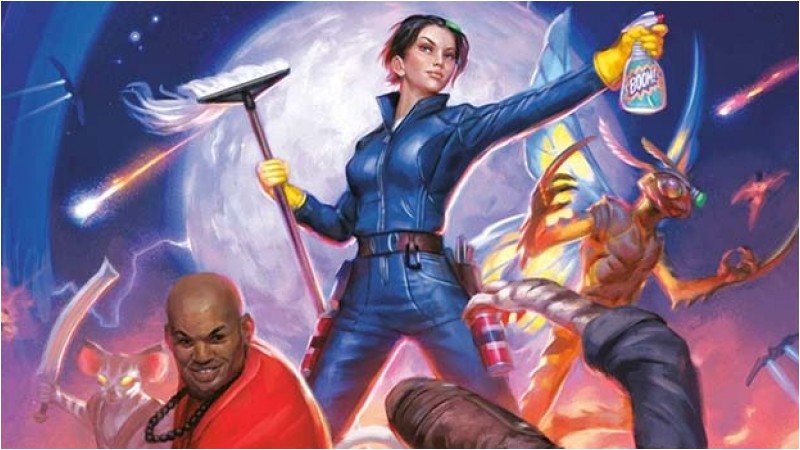Bringing a Hero Home: Terminal Peace Deftly Concludes the Janitors of the Post-Apocalypse Series

It’s always a challenge to stick the landing of a really good series. It’s even trickier when several years have passed since the release of the previous book, and it’s especially difficult when those passing years were during a global pandemic. But with Terminal Peace, Jim C. Hines brings his “Janitors of the Post-Apocalypse” series to a close with a novel that’s still as funny and clever as the first two but also features a surprisingly deep exploration of mortality, the ethics of free will, and the perils of war.
Back in 2017, which seems even longer ago now than it actually was, Hines introduced readers to Marion “Mops” Adamopoulos, the Lieutenant in charge of Shipboard Hygiene and Sanitation (the janitorial staff) on the starship Pufferfish. Long before, a disaster rendered Earth uninhabitable, and humans feral—zombie-like, predatory, thoughtless versions of former humans. Thanks to the help of Krakau scientists (squid-like aliens and leaders of a galactic alliance), some humans had been cured, more or less.
Now practically impervious to pain, quick to heal, and incredibly able mercenaries, humans became a feared force throughout the universe. This made them an asset to the Krakau Alliance in the war against the Prodryan Empire. But in the first two books in the series, Mops and her team (who end up in command of the Pufferfish, with Mops as captain) discover some incredibly unsavory truths about who’s at fault for the downfall of Earth. (Spoiler alert for the first two books: it’s the Krakau. But it was an accident! Really!)
Terminal Peace beautifully balances a delicate line between recapping just enough so that readers can remember what went on before, but never retreading too much ground. There are no summaries here, just responses from Mops and her team that remind readers, “Oh yes, that’s what happened.” While Terminal Peace isn’t the best place to start the series, a reader could jump in here without ever feeling too much at a loss for what’s going on, because Hines deftly manages the world-building in brief snippets, and because the story starts moving along in a new direction almost immediately, as Mops takes on one last mission to end the war between the Krakau Alliance and the xenophobic Prodryans, who are determined to wipe out every other sapient species.
-

-

-

-

-

-

-

-

-

-

-

-

-

-

-

-

-

-

-

-

-

-

-

-

-

-

-

-

-

-

-

-

-

-

-

-

-

-

-

-








































